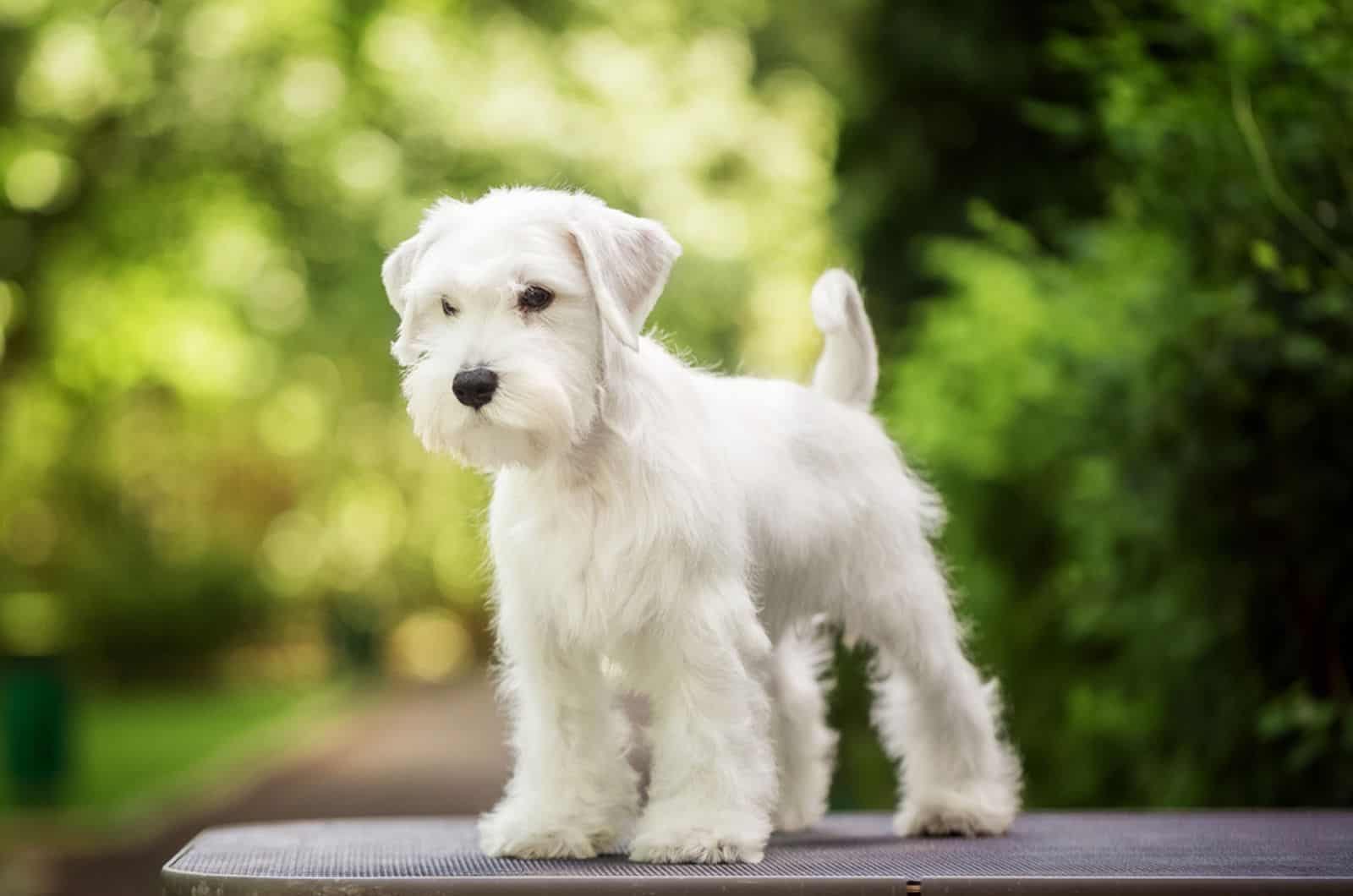If you love dogs as much as we do here at PupVine, then you probably already know that Miniature Schnauzers are one of the most popular pure dog breeds in the United States. That is all thanks to their very extroverted personality, high activity levels, and slightly independent character.
Despite the fact that they occasionally like to get their way, Mini Schnauzers are extremely intelligent dogs that have easily won our hearts.
In addition to keeping their owners happy and warm, Miniature Schnauzers are regarded as the extroverts of the doggie world because of their high spirits.
Before deciding on a new Mini Schnauzer puppy that is going to be a new member of the family, it is crucial to understand the size of your potential doggo.
In order to help you get ready for this small dog with a huge attitude, we decided to write more about how special these high-energy canines are.
Stick around with us because this Miniature Schnauzer growth chart will teach you everything you need to know about the Mini Schnauzer breed dog’s lifelong size and weight, as well as the factors that affect its growth and the specifics of its various developmental stages.
Miniature Schnauzer Growth Chart Preview
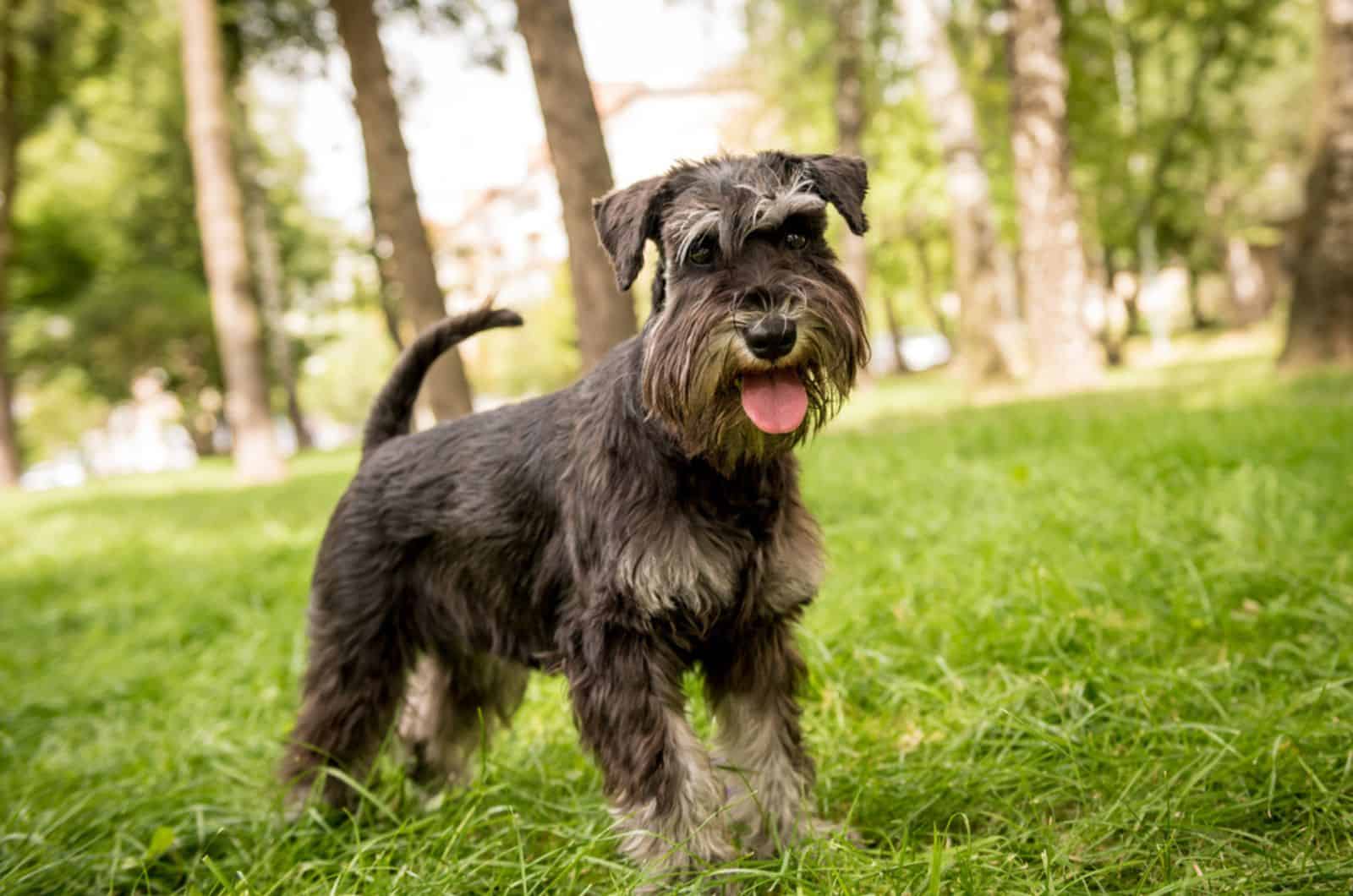
Due to the fact that the Miniature Schnauzer is one of the Terrier dog breeds, you should not expect it to reach super tall heights and to weigh heavy. Its small and sturdy body really adds to its tall appearance. But, it takes over twelve months for a Miniature Schnauzer puppy to grow to its full size. Here is what I mean:
Age Male Miniature Schnauzer Height Female Miniature Schnauzer Height
[table id=649 /]
Miniature Schnauzer Weight Chart Preview
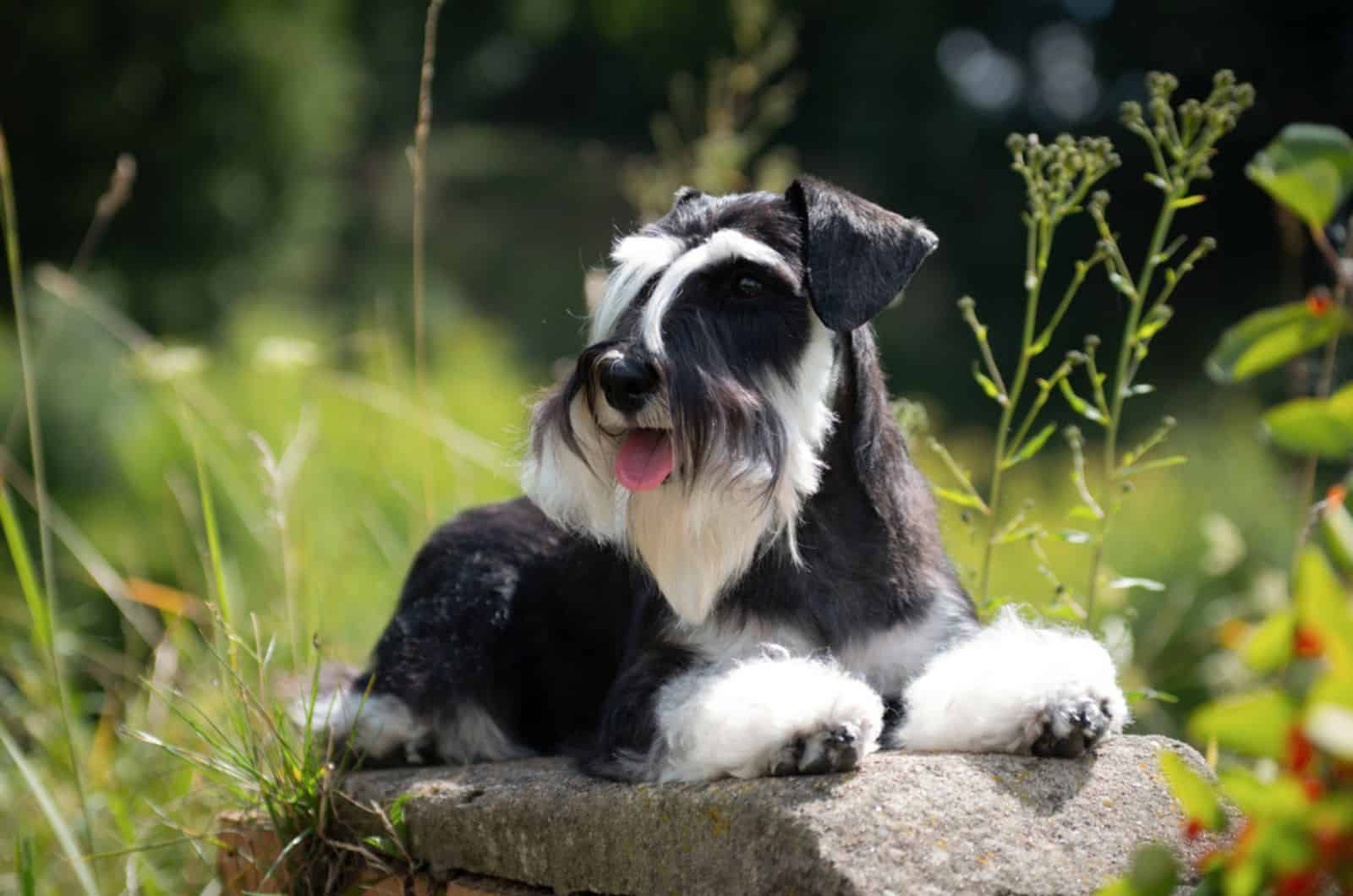
Being smaller dogs, Miniature Schnauzers don’t gain too much weight. It would be rather unnatural if they weighed more than larger dogs!
Before reaching adult weight, a Miniature Schnauzer puppy goes through a lot of developmental changes in which it puts on some muscle mass, reaches sexual maturity, and learns how to behave towards other dogs and humans.
But, we will get to that later. Let me show you how much a Miniature Schnauzer weighs during the first year of its life!
[table id=650 /]
A Miniature Schnauzer size noticeably changes during the first twelve months of age. But, unlike in larger dogs, rapid growth rates are not common in the Miniature Schnauzer dog breed.
You see, a Miniature Schnauzer dog’s weight steadily goes up, without any huge gaps in between.
Miniature Schnauzer Puppy Growth Chart
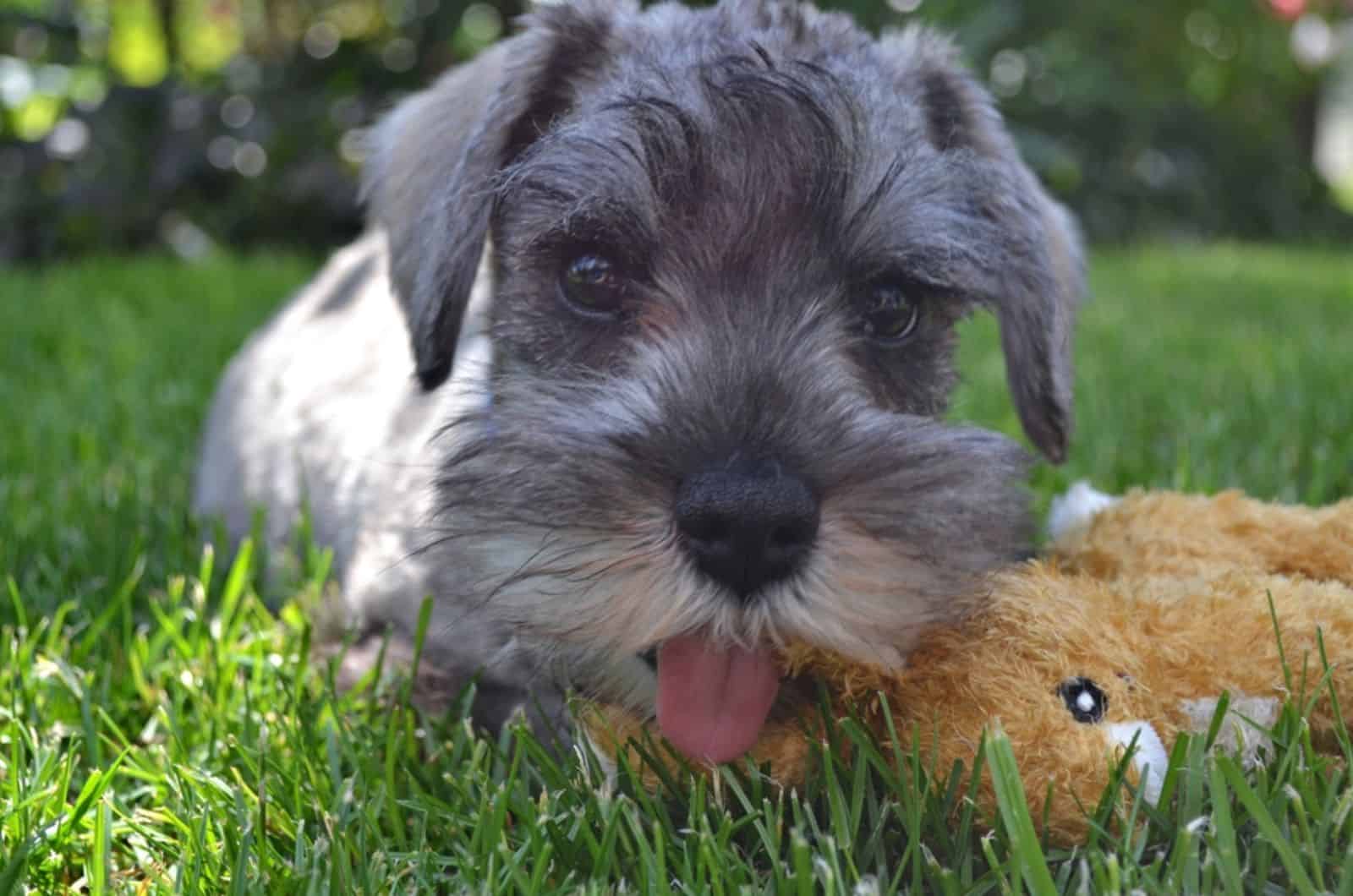
When it comes to their size, Miniature Schnauzers are very different from Standard Schnauzers and Giant Schnauzers. They stay small for the rest of their lives for a variety of reasons, one of them being selective breeding.
The Miniature Schnauzer puppy grows slowly until it reaches its adult height, which is still considered small because this dog belongs to the toy group. The Teacup Miniature Schnauzer is even smaller than the miniature one!
That said, it is normal for a Miniature Schnauzer puppy to be, well, miniature!
Male Vs Female Miniature Schnauzer Growth Chart
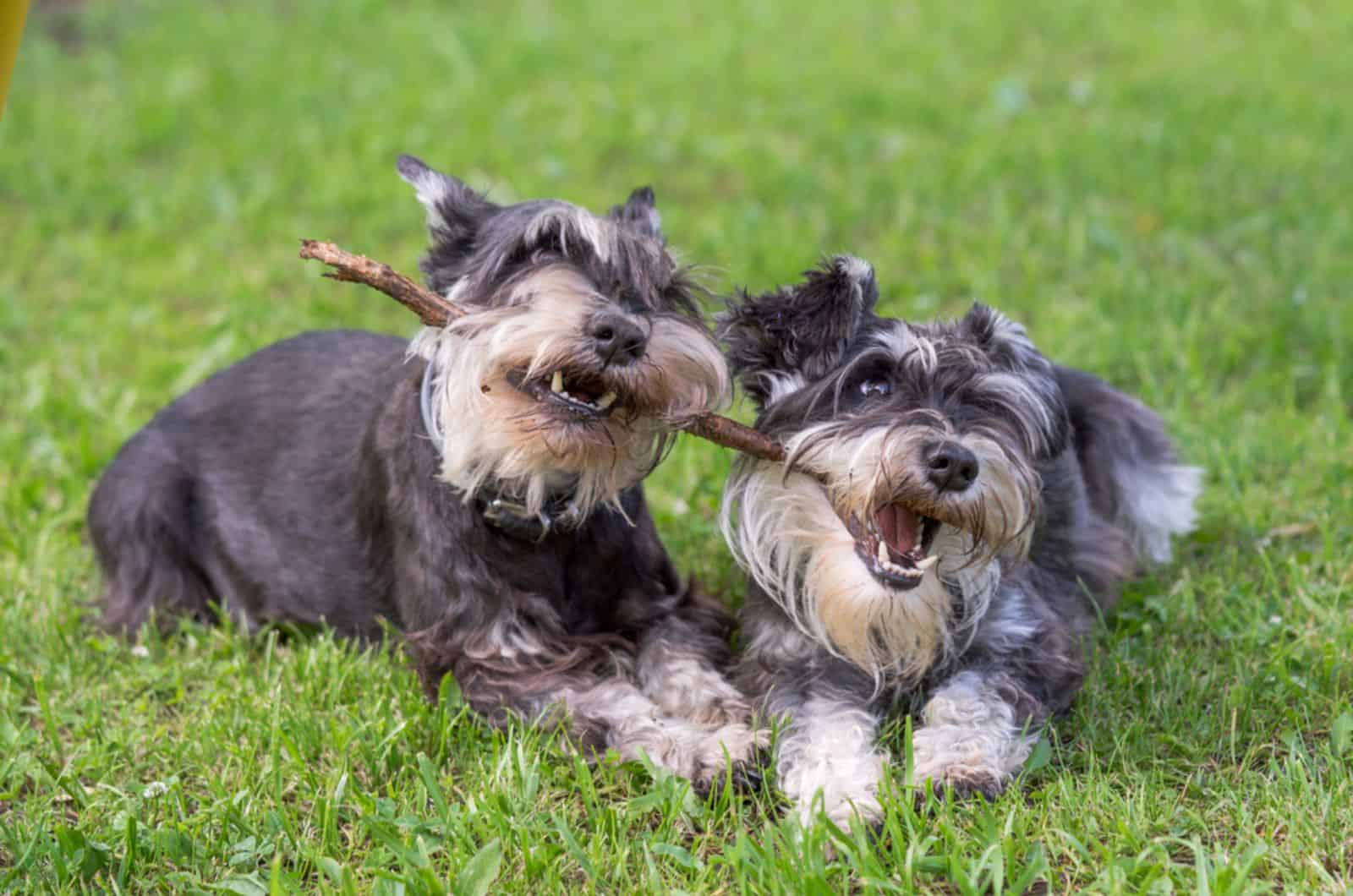
Even though they are small dogs, male Miniature Schnauzers tend to be slightly taller and larger than their female counterparts. It can be a bit tricky to notice this at first because both genders of the Miniature Schnauzer dog breed look very much alike.
You can clearly see differences between male and female Mini Schnauzers when they reach their full height and adult weight.
However, it is a known fact that a female Miniature Schnauzer dog is typically smaller and matures more quickly than a male dog. While this particular trait comes in handy during training, it does not mean that female Mini Schnauzers are smarter than males.
Besides their appearance, there may be differences in their personalities. For example, When challenged, male Mini Schnauzers may exhibit more aggressive behavior that is directed toward other male dogs.
On the other hand, female Mini Schnauzer dogs can be more independent and less affectionate, which means they are likely less eager to please their owners.
How Big Will My Miniature Schnauzer Get?
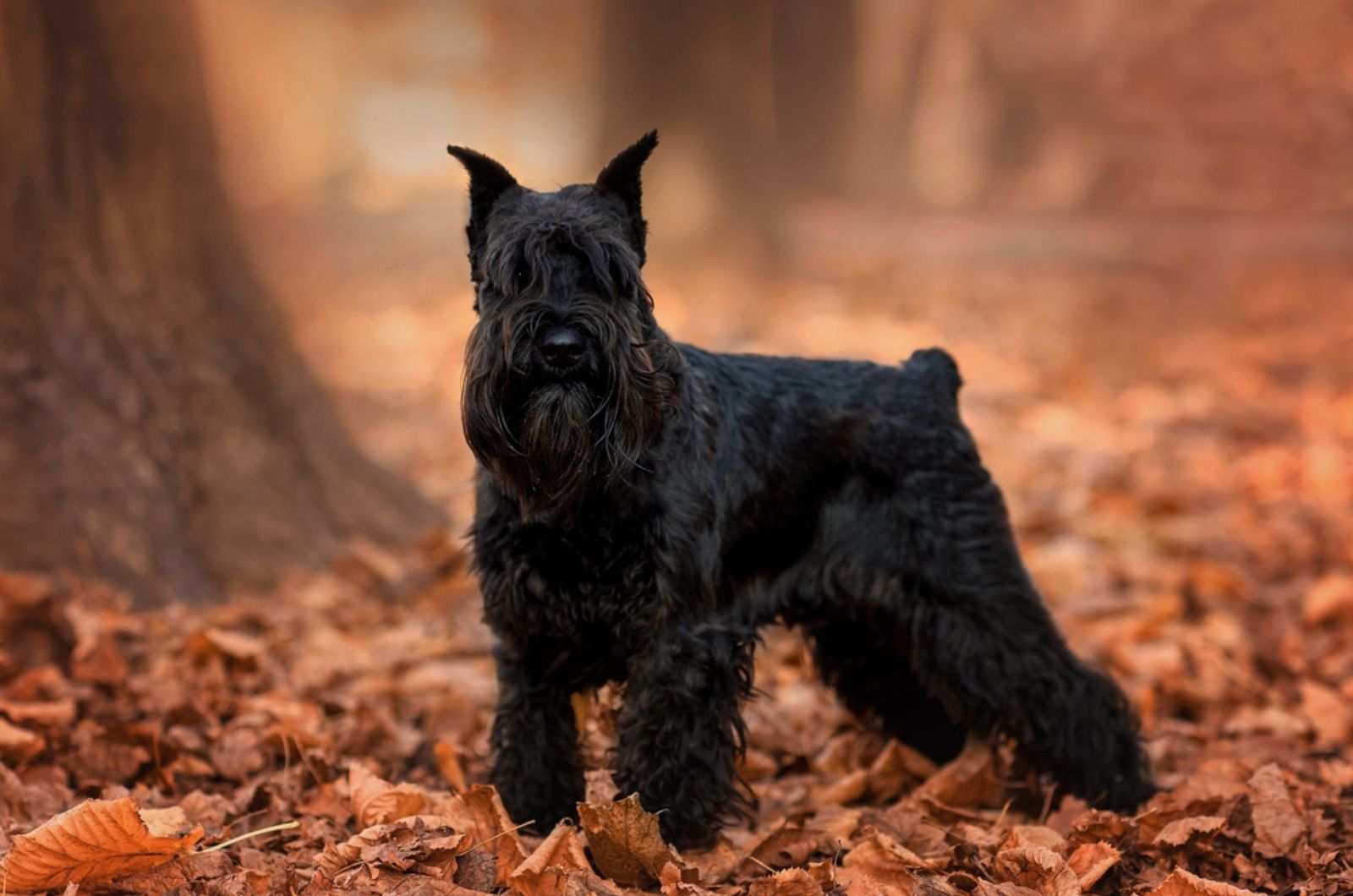
The short answer is that your Miniature Schnauzer will get to at least 14 inches tall if it is a male; if it is a female it will stand at about a maximum of 13 inches tall. As for their adult weight, you can expect a full-grown Mini Schnauzer to weigh at least 18 pounds.
External influences greatly affect the Miniature Schnauzer’s growth and they include things like nutrition, living conditions, training, and exercise, as well as the general lifestyle. In other words, as dog owners, we can change the external factors that affect our Mini Schnauzer’s size and growth.
However, we can not change the internal factors that dictate the Miniature Schnauzer puppy’s growth. These include genetics and gender of the pooch, which is difficult even for professional breeders to control.
Miniature Schnauzer Puppyhood Stages
Puppyhood is great for both owners and Mini Schnauzer puppies because everyone is having fun! Except when these puppies get the zoomies and can’t calm down when you try to work in peace!
But, overall, Miniature Schnauzer’s puppyhood is among the most exciting stages a dog owner will go through.
Here are some highlights of the Mini Schnauzer puppy’s journey to becoming a full-grown adult dog!
How Big Are Miniature Schnauzers When They Are Born?

Baby Mini Schnauzer puppies are teeny-tiny balls of fur that don’t weigh much more than a few ounces. However, their growth rate quickly accelerates once they begin drinking their mother’s milk (nursing) and receiving all the essential nutrients. The first milk that a Mini Schnauzer puppy drinks is called colostrum and it is essential for the normal development of the pup’s immune system.
Everything Mini Schnauzer pups eat goes straight toward their growth and development because they spend their days either sleeping or eating. They typically gain one to two pounds each of these weeks.
There are times when Mini Schnauzer’s mother’s breast milk is insufficient because puppies are too frail to use their mouths to stimulate the flow of milk. So owners must step in to provide their mini pups with formula.
Some Mini Schnauzer puppies in the litter will be larger than the rest. The larger puppies will tend to grow more quickly because they are dominant pups in the group and naturally ingest more milk.
2 Weeks To 4 Weeks
During this period Miniature Schnauzer puppy’s weight should be recorded each day. In this manner, Miniature Schnauzer owners can assess the puppy’s growth and determine whether it requires additional food stimulation or just normal development.
Mini Schnauzers begin moving around on their own for the first time during this brief period, which is the other significant lifestyle change. Their bodies have grown to about two pounds or less.
Not only do Mini Schnauzers start moving around, but they start looking at their owners with adorable puppy eyes that are now fully opened and developed. Schnauzers are dogs with rose ears and their ears are fully developed now!
As adventurous and energetic as they are, Mini Schnauzers are gradually starting to take in the world around them.
Because these little puppies are now using more energy than before, switching to solid puppy food is crucial. It gives them the extra calories and nutrients that they are unable to obtain from their mother.
That said, Mini Schnauzers are soon to realize what real puppy food tastes like because they are starting to get weaned off of their mother’s milk. At this point, Mini Schnauzer pups are encouraged to try some solid puppy food for the first time!
4 Weeks To 12 Weeks

Now that they’re moving around and tasting new things with their eyes, ears, and mouth, Miniature Schnauzer puppies are ready for early socialization! That’s right, this is the perfect time to start socializing these little rascals since later stages of socialization require more time and patience.
The socialization phase is something like the second stage on the Miniature Schnauzer growth chart.
Although this dog breed is small, a Miniature Schnauzer puppy should still be stimulated to increase its activity level and cognitive functions.
Early neurological stimulation and focused socialization training are necessary for the Miniature Schnauzer puppy.
Miniature Schnauzer puppies are very active by nature and can occasionally display aggression or self-destructive behavior which is why it is important not to leave them alone for extended periods of time.
3 Months To 9 Months
Miniature Schnauzer puppies are now super confident about exploring the world around them. In fact, they are doing it now more than ever!
It may be hard to keep up with a three-month-old Miniature Schnauzer puppy so much that you will ask yourself “When do these puppies get easier?!”
Miniature Schnauzer puppies are now much more physically active, and now is the perfect time for simple backyard games like hide-and-seek or fetch, as well as leisurely strolls around the neighborhood. Keep in mind that a puppy at this age should be pampered with a satisfying meal or a small treat after quality playtime or training.
This is a great way to instill obedience, and socialization in your Miniature Schnauzer puppy and prepare it for adulthood. This is a fantastic method for dog owners to reward positive behavior.
9 Months To 12 Months
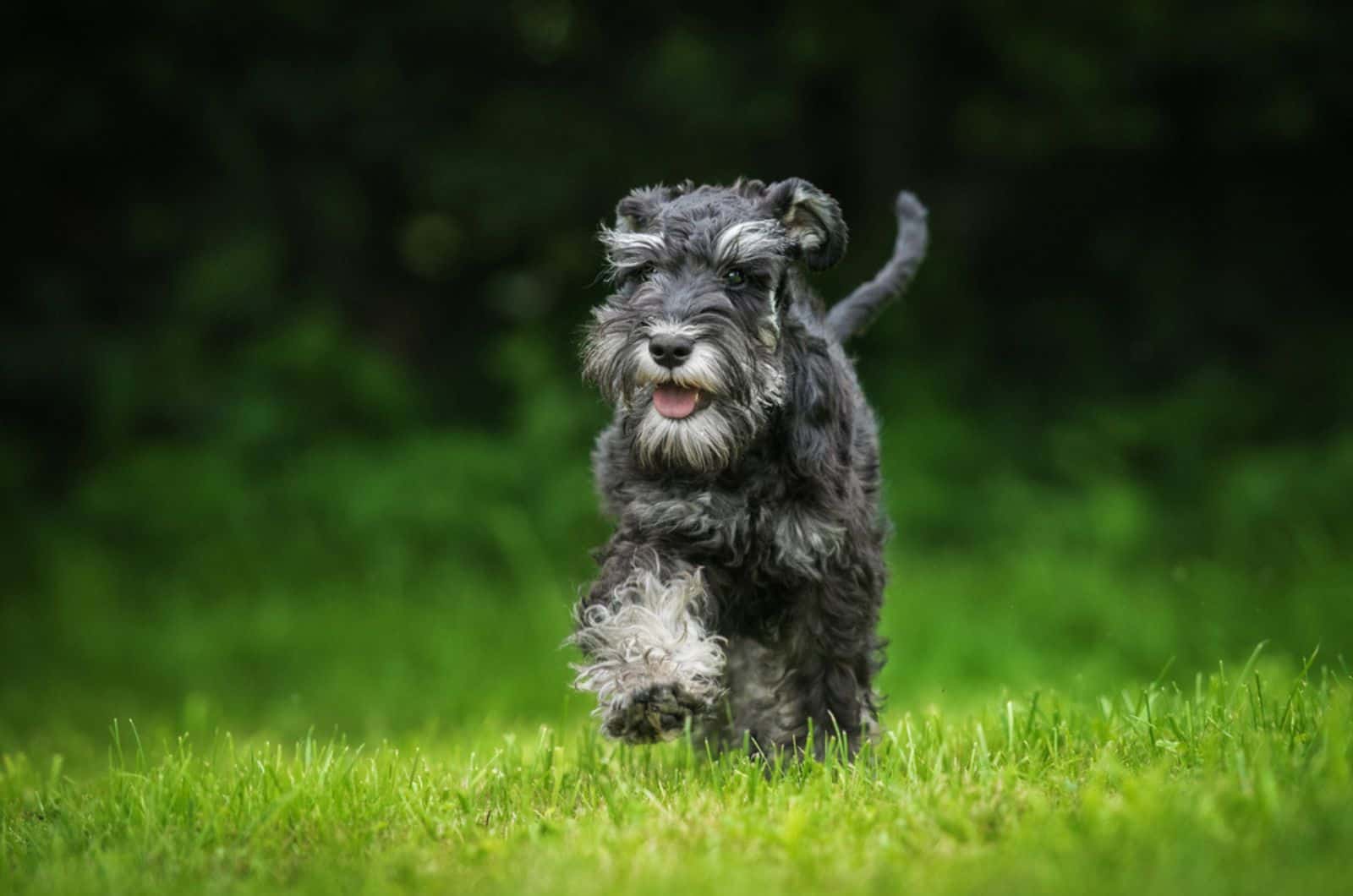
Dog owners, I hope you re full of patients because this period marks the sexual maturity of your Miniature Schnauzer puppy.
It may seem contrary, but during this period Miniature Schnauzer puppies seem to calm down and behave more like adult dogs. Well, this is because one-year-old Mini Schnauzers are basically adult dogs!
Even though we have said that they calm down a bit, don’t expect a Miniature Schnauzer puppy at this age to be super laid-back. Though, there are many factors that affect a puppy’s level of activity, like gender or training regimen.
Many male Miniature Schnauzer puppies at this age will start to show signs that they want to mate, while females may also show restlessness during their first heat cycle.
With sexual maturity comes the distinction between male and female miniature Schnauzers. Gender differences become more pronounced and obvious than ever as a result of hormonal changes.
The size difference between male and female Miniature Schnauzers is immediately noticeable, aside from the fully formed reproductive organs and females beginning their first heat cycle.
18 Months To 24 Months
After reaching all developmental milestones, both male and female Miniature Schnauzer puppies are now adult dogs. Both have reached their full-grown weight and height of about 10 to 18 pounds.
The weight of your Miniature Schnauzer at this period can vary depending on the activity level and diet plan, but it should fall within the aforementioned healthy weight range.
Since the Miniature Schnauzer puppy’s adult size does not change much, the only physical growth that has any significance is weight gain. That said, you should be cautious if you notice that your Miniature Schnauzer adult dog is gaining weight.
Excessive weight gain can be very dangerous in the Miniature Schnauzer dog breed because they are prone to developing obesity.
At What Age Is A Miniature Schnauzer Considered Full-Grown?
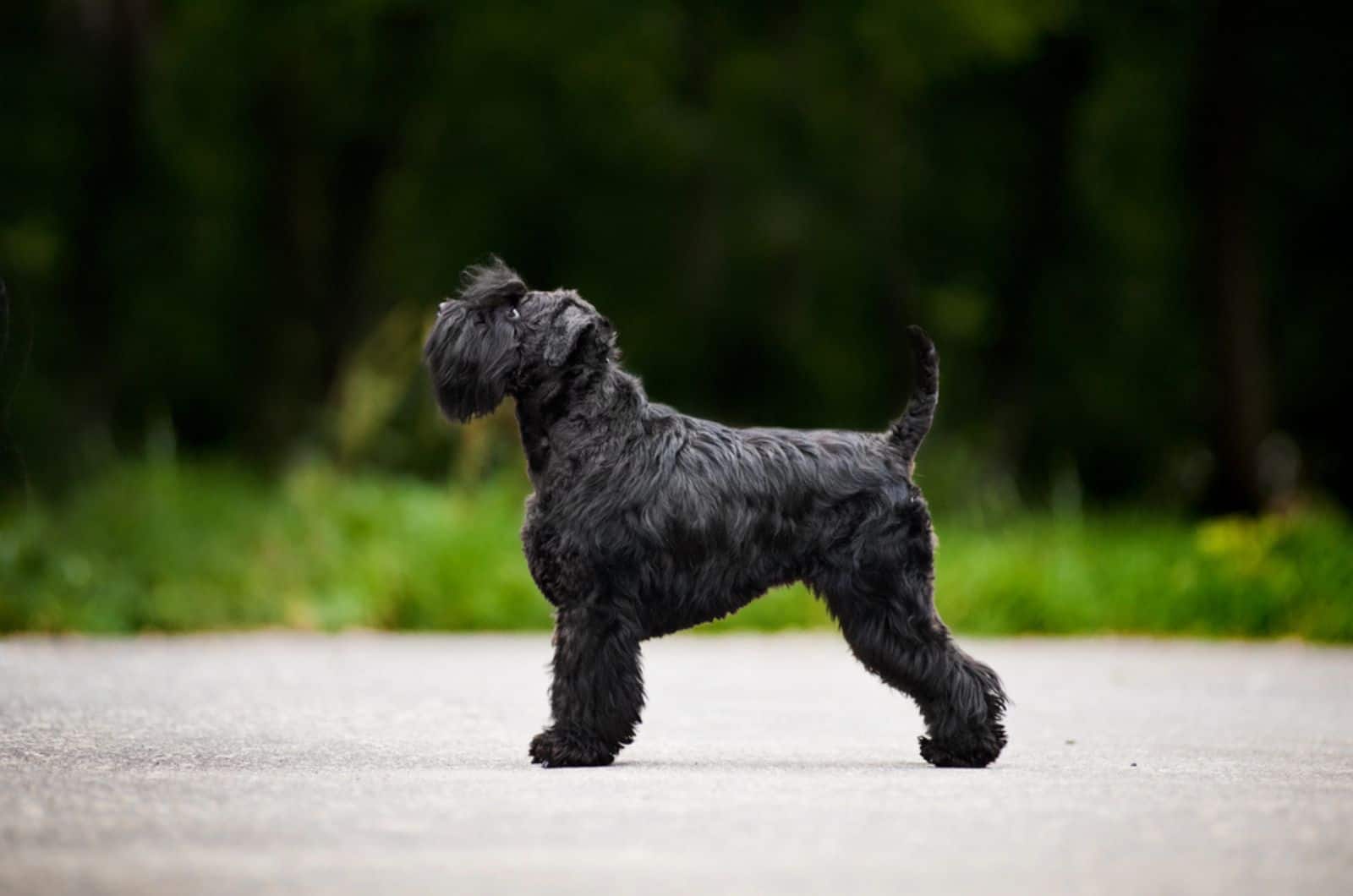
It is widely known that the majority of small dog breeds such as the Miniature Schnauzer reach their full size when they are 1 year old.
This is totally different in larger dogs because most of them are not considered full-grown even when they reach 24 months of age!
But, let’s get back to the Miniature Schnauzer is a smaller dog that reaches maturity at about 12 months of age.
Keep in mind that each Mini Schnauzer is an individual which means that some may reach adulthood on their first-year birthday, while others may need a bit more time to mature. Some Mini Schnauzers can grow physically into adult dogs but mentally stay like little puppies!
What Is A Typical Weight Range For A Miniature Schnauzer?
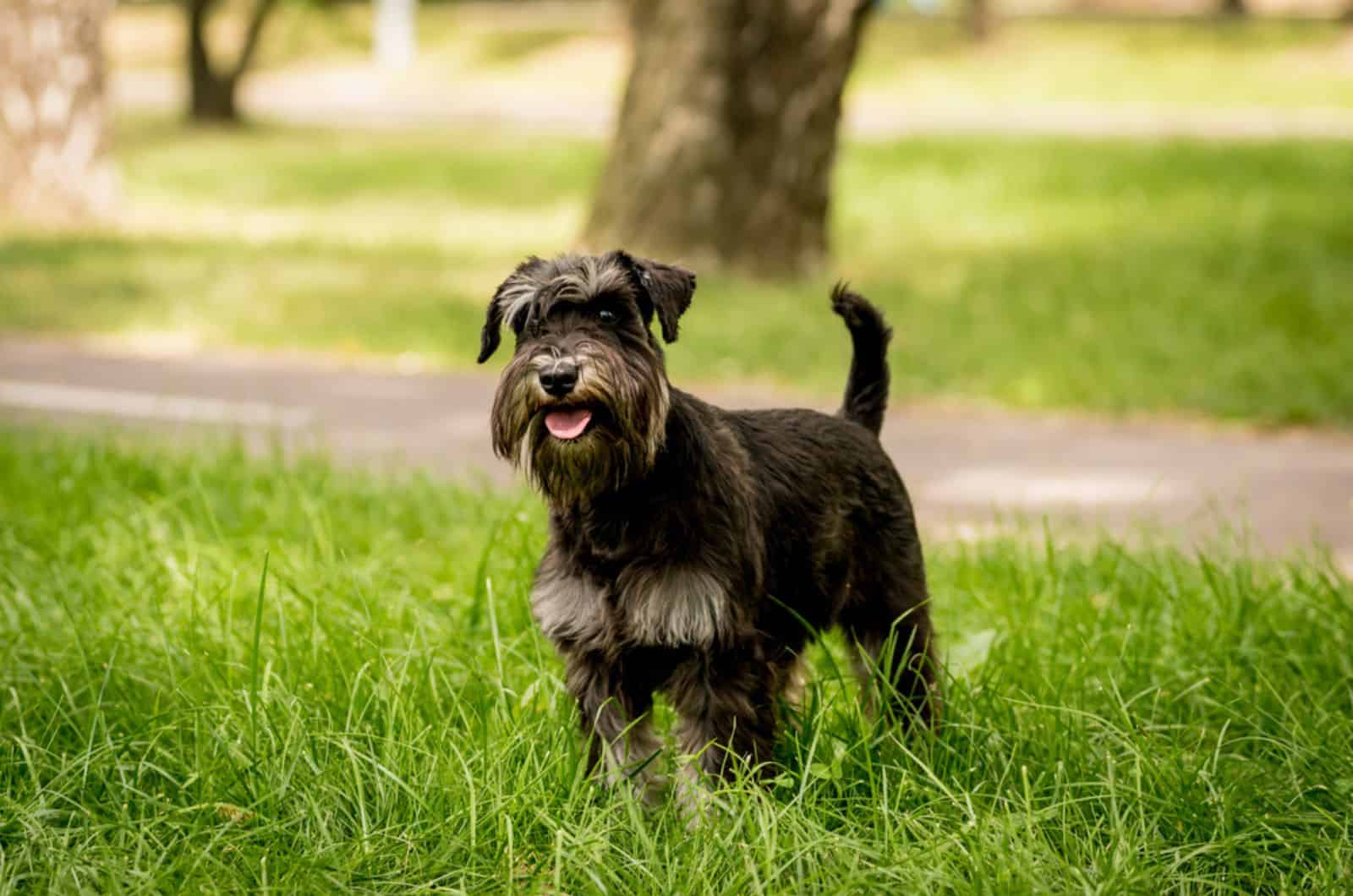
Let’s remind ourselves that the Mini Schnauzer is among the German dog breeds that are known to grow pretty robust and stocky. Even though a Schnauzer of any size looks pretty muscular and tough, the Miniature Schnauzer stays cute and adorable. However, it still has some toughness in his look!
So, a typical weight range for a Miniature Schnauzer is different in females and males.
What Is The Ideal Weight For A Mini Schnauzer?
Male Miniature Schnauzers should have a weight range between 11 to 18 pounds, and some may even reach 20 pounds which is still considered a-okay.
As for female Mini Schnauzers, their adult weight ranges between 10 to 15 pounds with some being a pound lighter or heavier.
If you notice that a Mini Schnauzer is the smallest in the litter, then it may stay small for the rest of its life. As long as everything is okay with its health, then you do not have to worry!
Mini Schnauzer Body Condition Score
Every (aspiring) Mini Schnauzer dog owner should know what a body condition score is. Firstly, I must say that is a very useful tool to determine whether the Mini Schnauzer is obese or not. It can also show you if your Mini Schnauzer is underweight. So, how does BCS work?
Your Mini Schnauzer’s body condition score is actually a number (from 1 to 9) that is determined by an assessment of the amount of fat in a few specific areas of the body.
For short, a Mini Schnauzer with a BCS of 1 is severely underweight and probably in danger of starvation death. In contrast, a Mini Schnauzer with a BCS of 9 is overweight and requires medical attention.
Factors Affecting Miniature Schnauzer Growth
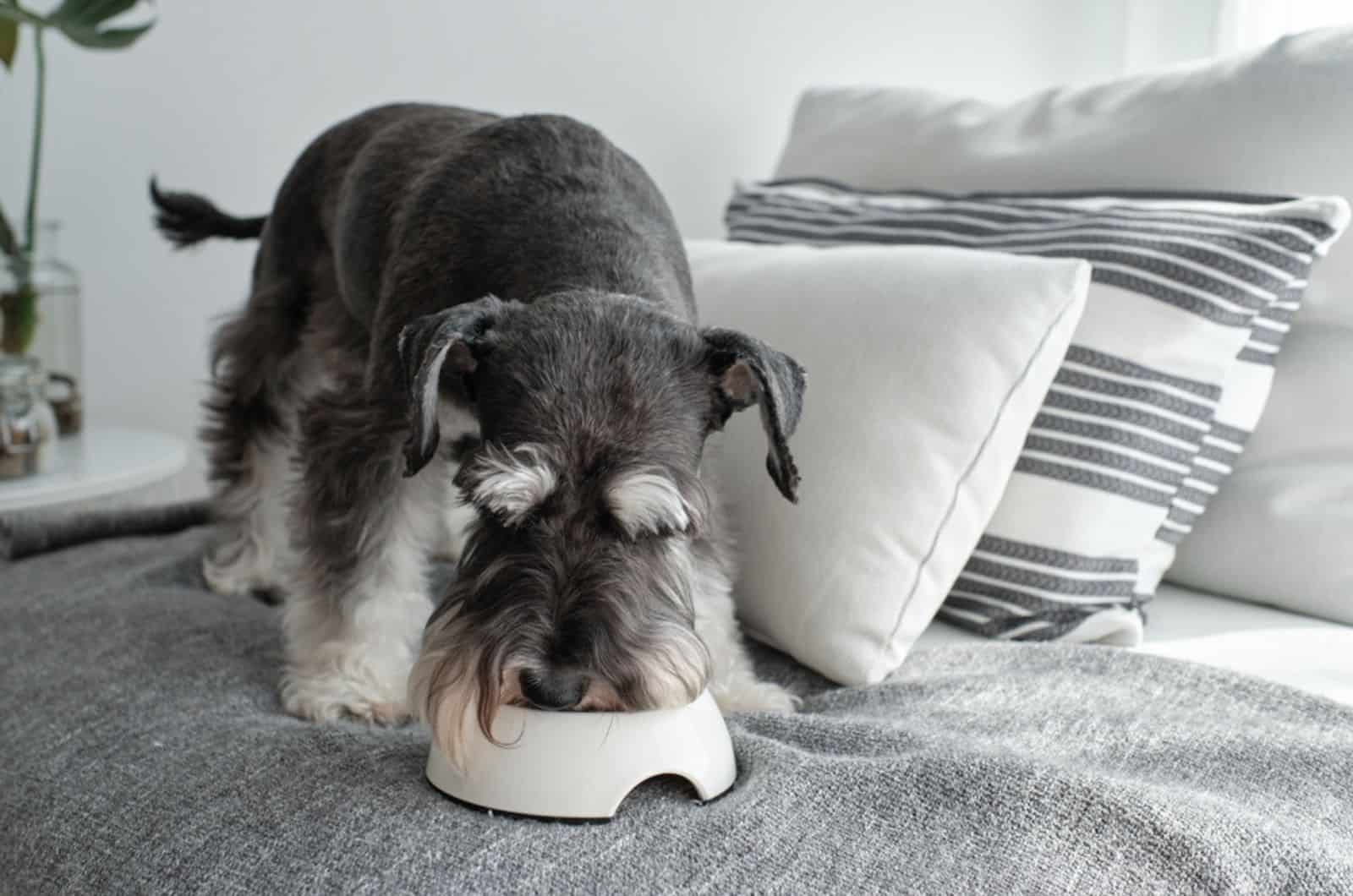
There are a variety of reasons why your Mini Schnauzer is growing very fast or growing very slow. While some of these are under your control, some are under the paws of mother nature and none of us can do anything about it!
Are you wondering about what factors affect the Mini Schnauzer‘s growth? Here they are!
It’s All About The Genetics
It is, really. Genetics determines how fast and how big your Mini Schnauzer dog will grow. All of it is written in its DNA and it is very difficult to change that.
Reputable Miniature Schnauzer breeders from all over are doing their best to mix and match parent dogs that are free of any breed-specific diseases that can cause growth stunts, developmental problems, and lifelong chronic health problems.
So, it is all about what Miniature Schnauzer dogs are matched to create the healthiest puppy that will grow normally.
You Are What You Eat
Indeed you are, and so is your Miniature Schnauzer. Without quality food, be it dog food or a natural diet, there is no normal growth or development. As it is stated in the Miniature Schnauzer’s feeding chart, its small body needs all the nutrients that it can get to be able to run around and be active.
It is not only about physical activity because food is needed for proper cognitive function and development.
A hungry Mini Schnauzer can not learn tricks as fast as a well-fed one. It can not be focused as much as the Mini Schnauzer that just got a good and nutritious meal.
The same works with us humans, we can’t think well nor can we grow normally when we are always hungry!
Health Problems
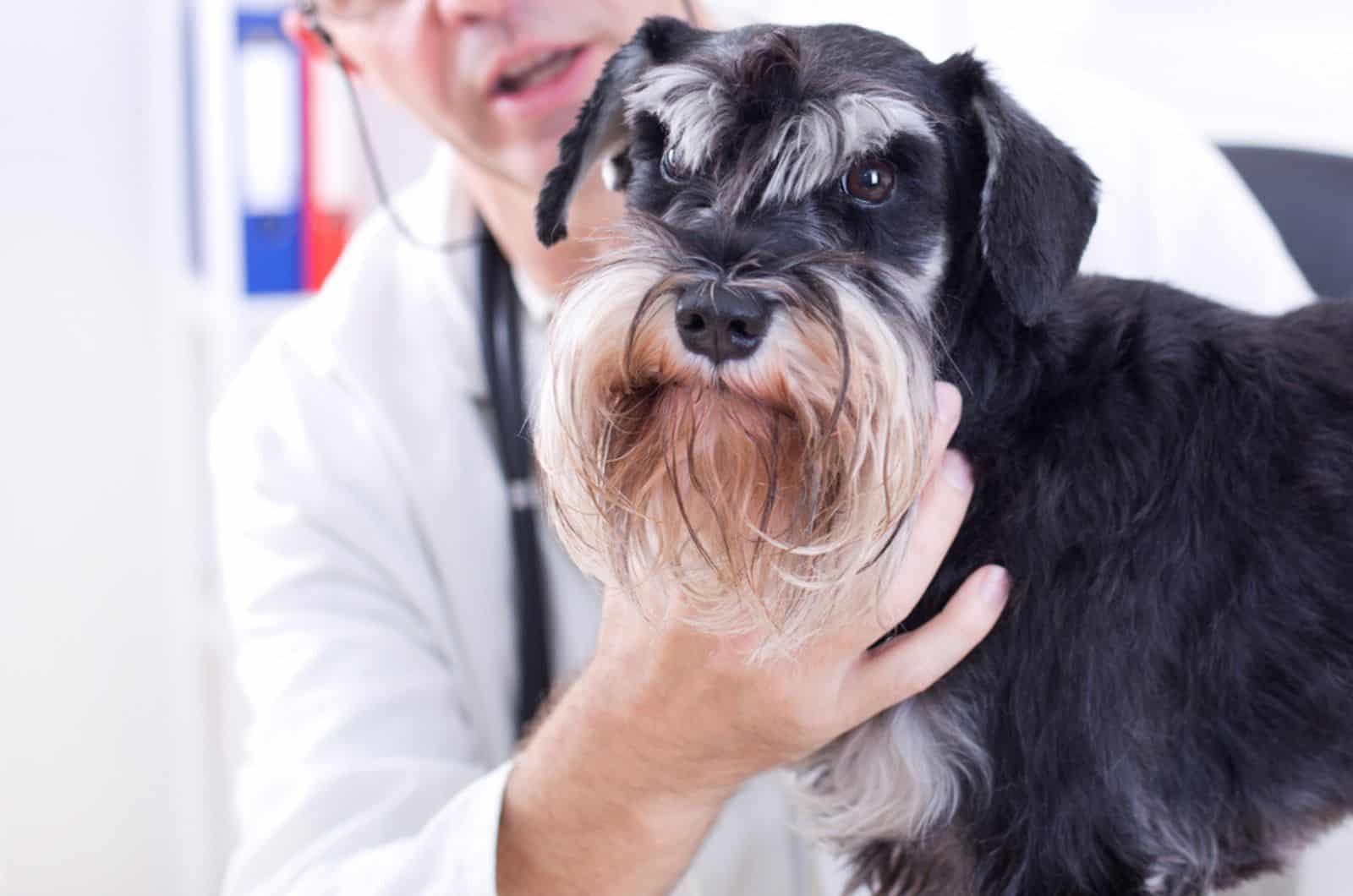
Although the Mini Schnauzer is considered a very healthy dog breed, there are several health problems that can be acquired or hereditary. These health problems usually prevent the Mini Schnauzer from eating. These are the most common ones:
- Dental Disease
- Obesity
- Hypothyroidism
Health problems that occur in Mini Schnauzer’s mouth such as Periodontal Disease can cause pain during eating which can cause the pooch to lose its appetite.
On the other hand, there are health problems that actually make your Mini Schnauzer’s appetite bigger, but then that results in obesity which is a whole new problem.
Metabolic diseases such as hypothyroidism can make the Mini Schnauzer’s body incapable of absorbing and metabolizing nutrients which is why it will abnormally gain weight.
Environment Is Also Important
There is no growth without the Sun and the Mini Schnauzer knows it all too well! In addition to getting those healthy Sun rays, a key role in the Mini Schnauzer’s growth is played by the environment it is in.
Mini Schnauzers are outgoing and should always be around their fellow humans or other animals. If they are left alone for too long, Mini Schnauzers can develop separation anxiety that will greatly affect their mental growth.
Even if the Mini Schnauzer is getting enough physical exercise, if it is alone and neglected for the rest of the day, it will develop behavioral problems.
No Growth Without Daily Exercise
Regular exercise offers much more benefits to your Mini Schnauzer dog than just a physical workout. Not only does it provide important mental stimulation, but daily exercise helps your Mini Schnauzer puppy grow emotionally. Yes!
Daily exercise has emotional benefits that will make your Mini Schnauzer more fond of you! After such quality time together, you will not be one of those people saying that Schnauzers are the worst dogs!
Besides their mental health, no matter their age, every Mini Schnauzer dog needs regular exercise because it keeps them in shape.
I can not stress enough how important it is for Mini Schnauzer dogs to remain fit and active. You see, lack of exercise can cause your Mini Schnauzer dog to gain too much weight, and get bored or frustrated.
Active Mini Schnauzers are much less likely to develop conditions like canine obesity and behavioral problems.
Unlike larger dog breeds, Mini Schnauzers do not require too much running and extended walkies.
At What Age Should A Miniature Schnauzer Be Neutered?
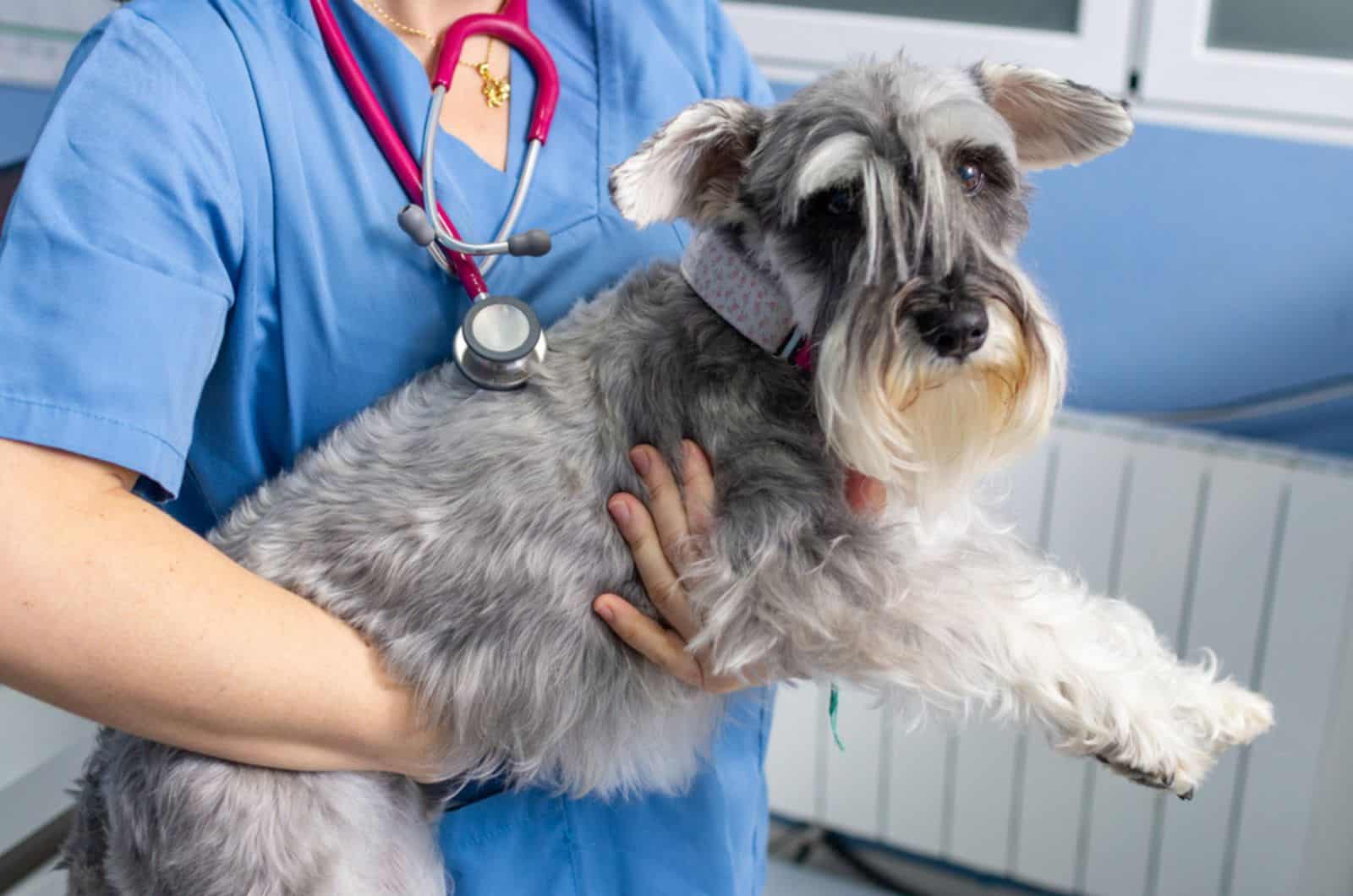
The best time to spay or neuter your Mini Schnauzer puppy is before they reach 12 months of age. If you don’t intend to have any more puppies in the future, then you should neuter or spay your Miniature Schnauzer puppy when it reaches six months of age.
You can also wait until it reaches 9 months of age, depending on what your veterinarian advises you.
There are many vets who believe that Mini Schnauzer puppies should not be neutered until they are 12 months old, while others believe that the perfect time for neutering or spaying is at around six months of age.
Each professional vet has a variety of reasons behind this which is why it is best to ask for advice. Therefore, to discuss the specifics of this common procedure, you should speak with your veterinarian.
Contrary to popular belief, early spaying or neutering will not prevent your Mini Schnauzer puppy from growing.
What Is The Average Lifespan Of A Miniature Schnauzer?
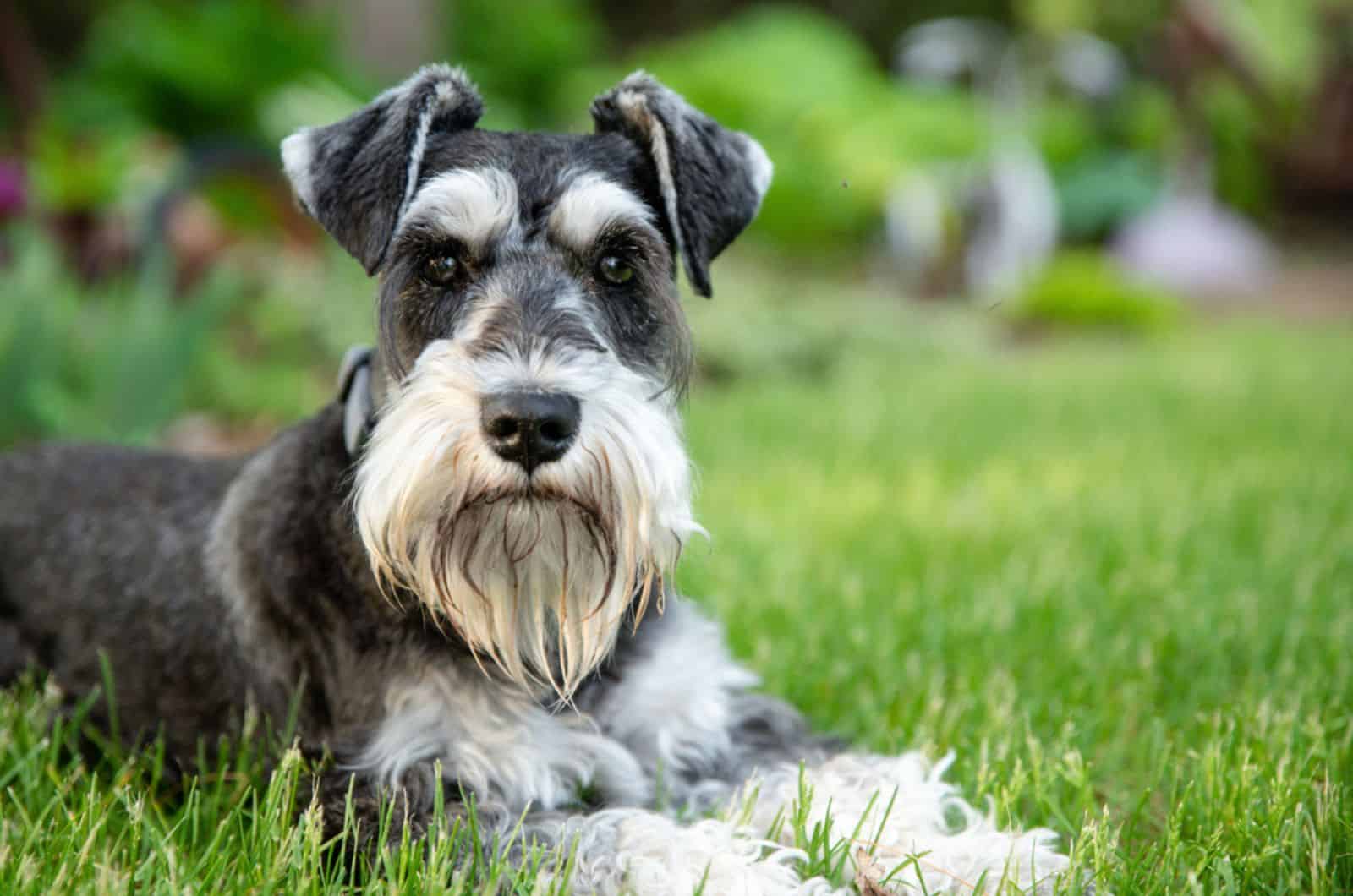
If all goes well and you are doing a good job at being a responsible Miniature Schnauzer owner, then you can expect your pooch to reach anywhere between 12 and 15 years of age.
Mini Schnauzers are long-living like most smaller dogs, thanks to their resilient nature and good genetics.
However, if you do not take good care of your Miniature Schnauzer puppy, then it may not live to 15 years of age. It is very important to take your Mini Schnauzer to the vet in order to keep its health in the best condition possible.
Only a happy and healthy Mini Schnauzer puppy that has grown up in a good environment can reach old age.
To Sum It Up
When talking about Schnauzer dogs, it does not matter if they are larger or smaller; what matters is how we understand their growth patterns and needs that arise during the first, most crucial year of their life.
A Miniature Schnauzer growth chart can be very useful, especially if you’re an aspiring Mini Schnauzer owner or simply an enthusiast of this dog breed.
Mini Schnauzer owners have already got the hang of their puppy growth, so there is no need to put a table of contents for them.
Remember that a Mini Schnauzer puppy growth can be affected by a variety of factors — external and internal. This is why it is important to find reputable Mini Schnauzer breeders who put a lot of work into genetics and ethical breeding.
Once you get your Miniature Schnauzer dog, it is your responsibility to feed it with high quality dog food, smother it with lots of love and care, as well as take it regularly to the vet’s to make sure that it is growing healthy and strong.
Related Content
Things To Know About The Jack Russell Growth Chart
